How To Groom Commissars (Part 4) - Sidney Rittenberg, "The Man Who Stayed Behind"
Hard-earned lessons about Communism from Sidney Rittenberg, the first American member of the CCP who lived in China from 1944-1979 and was imprisoned in solitary confinement for 16 years
Comrades: Sidney Rittenberg is the original CCP baizuo useful idiot.
Sidney lived in China for 35 years from 1944 to 1979 through the Civil War, Great Leap Forward, and Cultural Revolution. As the first American member of the CCP and confidant to many of its leaders, he saw the innerworkings of The Party more than any foreigner. Under the Chinese name Li Dunbai, he served as an aide to Premier Zhou Enlai and Chairman Mao himself. He also translated Mao’s Complete Works and the Little Red Book into English. Despite being falsely accused of counterrevolutionary activities and spending 16 years jailed in solitary confinement, he remained committed to the cause until he returned to the US.
In 1993 (coincidentally the same year Yuri Bezmenov passed away), Sidney wrote a captivating memoir called “The Man Who Stayed Behind”. I was struck by how similar he sounds to the leftists running around demoralized DIEvy League campuses and media outlets. As you’ll read, there are many moments where you want to shake him and yell WHAT DID YOU THINK WAS GOING TO HAPPEN, YOU FOOL?! What can we learn from his unique front row seat to history and Communist madness? I have condensed his 450 pages and 23 chapters into 16 excerpts with commentary and memes. TLDR: You cannot reason with a demoralized person - Sidney’s tale is a classic baizuo who took decades to understand how his luxury beliefs led to mass suffering.
I wrote this book because I had to… My story is the story of how I, and people like me, walked the Communist Road in the hope of creating a new and better world. And how for years we succeeded, sometimes beyond even our own expectations, in bringing hope and change to the people who needed it most. But at the same time, I wanted to paint a clear picture of the evils that ensued…
Sidney’s background is typical of Western leftists. He grew up in a wealthy Charleston family. His father was a prominent Charleston lawyer and President of the Charleston City Council, while his grandfather was a Russian Bolshevik revolutionary. While a student at UNC, he joined the American Communist party. He also attended Stanford to learn Chinese as part of his World War II posting. His naivete is glaring:
I had joined the American Communist party in 1940 while I was in college, partly because the Communists seemed to be the only group taking a strong antiwar stance… it was the Communists, with their strong posture on free speech and ethnic equality in America, and their roots in the American labor movement, who seemed to offer a hope of righting the injustices I saw all around me.
We cannot sugarcoat how brutal life was in China even before the CCP. Extreme conditions lead to extreme revolutions. After the last emperor was deposed in 1917, the middle kingdom fractured into many shifting anarcho-tyranny fiefdoms run by rival warlords. Nationalist (KMT) leaders Sun Yat-sen and Chiang Kai-shek tried to unite the country while fighting off the Japanese. Sidney was radicalized after he was assigned to investigate an incident where drunk soldiers ran over and killed a young peasant girl he named Wood Fairy. His superiors instructed him to give her father a pitiful $26 as compensation for his tragic loss, while the soldiers were never punished. He decided to stay in China to fight for justice of girls like “Wood Fairy”:
Even after such a disastrous wrong had been done to him, Li (father) still felt compelled to split his compensation with each official who had in any way contributed to his receiving of the money - including a member of the foreign army that killed his daughter…. even after things went bad, I often thought of Li, and of his little daughter. I think I chose the road I did and stuck to it as long as I did because… I genuinely believed it was the only way I could help change the miserable lives of people like Li Ruishan and his daughter, Wood Fairy.
After World War II ended, Sidney became an “observer” for the UN Relief and Rehabilitation Administration. He saw horrific scenes of famine as corrupt KMT officials hoarded humanitarian aid while their people starved. Sound familiar? He also served as a translator for American military leaders as they tried in vain to broker a peace between the KMT and CCP. His stories of privation were horrific:
They were filling the town, swarming like hornets, barely like human beings. They were desperate… these hollow-eyed people stared straight at us, looking holes through us, surrounding our jeep. They didn’t beg for money. They demanded food…
She was from Changzhou in Jiansu Providence. She had 7 brothers and sisters and her father had sold her to one of the buyers who traveled out from Shanghai looking for young girls for the brothers. At first she was terriefied and cried all the time… By selling her, they had earned enough money to keep the littler ones alive for a while longer.
As his disillusionment deepened, Sidney sought out the Communists in 1946. He walked 15 miles a day for over a month to reach their mountain stronghold in Yanan. He is euphoric seeing what he believes is a utopia and meeting Chairman Mao:
I felt a strange exultation. Everything around me seemed clean and pure… I was in a place far from the naked greed and corruption I had already seen too much of… Mao took my hand. His grasp was firm, but he didn’t really shake hands. He smiled faintly and bent slightly toward me. “We are happy to welcome an American comrade here to take part in our work.”… While I was flattered to be singled out for Mao’s attention, I couldn’t help contrasting him with Zhou Enlai. When I was with Zhou, I felt I was with a real friend, a comrade. With Mao, I felt I was sitting next to history. With Zhou I felt warmth, with Mao, awe.
Sidney began working as a propagandist for the New China News Agency. He believed he was on a holy mission:
Like the early Christians our lives were circumscribed by our caves, our catacombs… No matter what the content, in form most of the stories were hard, metallic propaganda. But to me they represented the truth… These farmers would be the foundation for a thriving economy and a democratic political system… They were going to set up a socialist society, in which cooperation and mutual aid were the cornerstones, not private profit and greed. I was intensely proud of my role in this revolution…. it made me swell with pride to think that this new gospel of liberation was getting to the outside world through my hands.
The first incident to shake Sidney’s faith occurs when he attends a struggle session. CCP party organizers subjected landlord Zhang Yongtai to the fury of the peasants. They denounce and beat him, but Sidney remains devoted to their cause:
“Down with Zhang Yongtai! Down with the reactionary landlords! Bitter waters must be poured out! Revenge! Revenge!”… I felt sick. But I wrested myself from that feeling. This was revolution, after all. I knew the revolutionary theory. Unless the peasants arise and strike the landlords down with their own hands, they will never be able to throw off the weight of centuries of oppression and fear. As much as I hated such violence, I told myself that shying away from it was a sign of my petit bourgeois background. I believed that only this kind of class war could eliminate all wars.
YURI SUBSTACK VIDEO DEBUT: How To Make a Struggle Session Parody (3 min)
Comrades: Welcome to Harvard freshman orientation - a Chinese Cultural Revolution struggle session, with American characteristics. Inspired by the opening scene of 3 Body Problem and Downfall parodies. Enjoy the show!
As the CCP closes in on Beijing to win the war in 1949, Sidney was blindsided by a purge. For the next 6 years, he languished in solitary confinement. To break him, his captors conducted repetitive interrogations that false confessions failed to stop. His first wife divorced him because she was told nothing about his disappearance. He claimed that an Edwin Markham poem kept him from breaking. The message of the poem is cultish Stockholm Syndrome and cognitive dissonance - love your abuser.
They drew a circle that shut me out
Heretic, rebel, a thing to flout
But love and I had the wit to win;
We drew a circle that took them in.That’s what I had to do. The Chinese Communists had cruelly thrust me out Somehow, I had to draw a larger circle and take them back in with me again. I would love them back. I would make it impossible for them to reject me. I had to become more like them than they were. Whether or not they intended my imprisonment as a trial, I would use it that way.
How To Become a Cult Leader
Comrades: Know your history. Don’t drink the kool-aid. Beware of sanpaku eyes. Anytime I see the words “How To”, I will check it out. Netflix featured famous cult leaders in its show “How To Become a Cult Leader”, analyzing the techniques they used to control their followers. Today, I will draw the parallels between 5 cults of the past and the leftist cu…
As abruptly as his imprisonment began, it ended. Ever the obedient bootlicker, Sidney immediately reenlisted at CCP propaganda organs. He remarried and name dropped a few limousine liberals Americans he came across:
The Americans in Beijing loved the Chinese. Some of them were refugees from American McCarthyism, like Jane Sachs Hodes, whose father was Harry Sachs of Goldman Sachs. She and her husband, a physiologist, had fled with their three children when their left-wing views had made Bob Hodes’ university position untenable. Now they were both living and working in Beijing.
The Hundred Flowers campaign launched in 1956 with great fanfare. Mao encouraged criticism, but it was a trap to round up dissidents. Sidney gets caught up in the peer pressure to denounce a friend
For the first time, I was going along with the persecution of someone - and a friend at that - who I couldn’t really believe was disloyal to the party. I rationalized it by telling myself that it looked like his thinking, not his emotions, were anti-party. But I became depressed and worried about the future of the party… My doubts were twisted with my zeal to do right by the party. Doubt tangled with loyalty. Dogma, pride, common sense, disbelief, certainty, fear, altruism, self-interest, and self-sacrifice all struggled within me and held me frozen in their thrall.
Now that Sidney was elevated to the elite inner circle, he was insulated from the mass suffering of the people. He wrote about all the palace intrigue during the Great Leap Forward from 1958-1962, but was not aware that tens of millions of people were starving to death. While he was quick to criticize the nationalists for the famine following World War II, he was silent about the Communists. The propaganda, hoaxes, and gaslighting escalated alongside the failures:
Later on, I heard about the extend of such exaggerations, and even deliberate deception. The model commune I had visited the year before had been revealed to be a hoax, the thick wheat assembled from fields elsewhere and replanted in one spot for show. Mao’s explanation, which I readily accepted was that such problems were local ones caused by zealous local cadres misinterpreting Mao’s words… The problems, Mao explained, and we all agreed, came from mistaken interpretations of his policies. No one dared challenge the Great Leap Forward itself.
How To Repeat History (Part 2) - The Great Leap Forward
Comrades: Know your history, or be doomed to repeat it. The Great Leap Forward was the largest non wartime mass killing in history, claiming 50 million lives. I am the descendent of those who suffered and died. 60 years after Great Leap Forward ended, The Great Reset is underway with eerie similarities. All you need to do is substitute a few words in the…
Mao trolled Sidney as a useful idiot white savior in front of a delegation of African communists, then shared a chilling premonition:
“Now please look at him. He is an American. He is a white man. Are you afraid of him?” The Africans in the room all burst out laughing. Mao laughed too, throwing back his head and roaring in the way that I remembered from back in Yanan. “There’s no need to be afraid of him. He is in America, but he is our friend… He is an internationalist fighter for Communism… Chiang Kai-shek, this yellow-skinned Chinese, is our enemy, while Li Dunbai, this white-skinned American, is our friend. Not all white people are your enemy. It is important to unite as many friends as possible. We have a saying in China. Narrow your circle of enemies to the smallest possible, and enlarge your circle of friends as widely as possible… Even after we get to Communism there will be a revolution. It seems to me that there will always be revolution, even ten thousand years from now. Otherwise what will people like us do? We’ll be unemployed.”
Sidney observed the party’s shift from rag tag resistance to elite rulers. The Resistance became The Establishment. Some animals are more equal than others:
Suddenly, the last few years of my life seemed selfish and venal. I looked down at the big belly protruding over my belt, the product of the last few years’ good living. I had been spending my time preening before high officials, cavorting with other foreigners, eating well and living well. The system was becoming corrupt, and I had allowed it to corrupt me. The party had let the necessary special privileges of the mountains in wartime run wild into an unconscionable elitist system. We were living in special quarters, eating special food, driving in special cars. We kept ourselves apart from the masses. I had even allowed myself to be talked into eating well during the great hunger when other people were suffering… I was in danger of ending up what I had always despised: a hypocrite and a phony.
The Chinese Cultural Revolution sparked off at universities during the 1966 Summer of Love and spread like wildfire, stoked by Mao:
A party functionary at Beijing University had put up a big poster accusing the university leadership of revisionism. The leaders at the university had tried to suppress the protest, and some people at the very top of the party had supported that suppression. Such suppression is wrong, the People’s Daily reported. In ringing, almost visionary language, the paper announced the beginning of a new revolution in China. The way a country goes rotten is from within, the broadcast continued…. Don’t let that happen in China! The high tide is now rising! A new day is dawning! Think for yourselves. Revolutionaries, arise! Think of the words of the Great Chairman Mao. Ignore all orders that conflict with that. It is right to rebel. The words were electric… Beijing took on the air of a city under siege…. We could feel Mao’s aggressive, restless, unruly touch everywhere. He was egging on the Red Guards, encouraging them to rebel. “You Red Guards are great!” he wrote. “You express rage and indignation against the crimes committed by the exploiting class.”
The Red Guards destroyed everything in sight that was associated with The Four Olds (Old Customs, Old Habits, Old Ideas, Old Culture):
Following Lin Biao’s instructions, the Red Guards were sweeping away the Four Olds. Red Guards were pulling the brightly colored wooden or neon signs off the buildings and smashing them into pieces…. Anything old and fancy that suggested bourgeois consumerism was being knocked apart. Shops with luxury goods, the Peking Duck restaurants, old street signs and shop signs with names that smacked of the old good-luck superstitions or of admiration for the old aristocracy - all were being shut down or smashed up.
The left ate its own and laid siege to Sidney’s offices and cadres:
They herded the old cadres from the center of the courtyard over to the eastern end and made them kneel down along the edge of the stone porch… one after the other were ordered to sing out the inscriptions on their placards. “I am counterrevolutionary…” I wanted to throw up. I couldn’t denounce the rebels. No one could. The crowd was too big, the mood was too ugly. Besides, ugly as it was, I couldn’t help seeing the revolutionary spirit in it. The young people had gone overboard, it was true. That, perhaps was the price of setting free a people who had no experience with freedom…. The huge balloons at the edges trailed long slogan-streamers: “Long Live Our Great Teacher, Great Leader, Great Commander-in-Chief, Great Helmsman Chairman Mao!”
Sidney made a fatal mistake giving honest feedback to Mao’s fearsome wife, Jiang Qing. It’s not hypocrisy, it’s hierarchy:
If Jiang Qing wanted my opinion of what was going on here, I would tell her. And when I thought of the bright promises with which we had taken power and what had happened since, I boiled over with pent-up anger. “Since taking power, the rebel regiment has become bureaucratic and high-handed… They’ve won the right to criticize, now they are denying everyone else the right to criticize.” I saw Jiang Qing’s eyebrows go up at once. Suddenly I had gone from her ally to her opponent.
China descended into anarcho-tyranny again. It was Lord of the Flies under a sinister puppetmaster. Sidney knew he was screwed when he was removed from a photo, Stalin-style:
The country was dissolving in civil war. There was no government. There was no authority. Every group had its own sponsor, every powerful figure supported by his own group. Factions fought factions, not with words this time, but with real weapons. I heard horrifying eyewitness report that the Red Guards at Qinghua University’s high school were capturing and torturing high school students from other factions, recording their screams for their own members to hear, to toughen them for battle.”… Mao had started it. Mao now wanted it stopped. It seemed he was turning back to his time tested ways of uniting people: throw them new enemies to fight. More and more, I began to realize that one of them was going to be me. Most of my foreign friends stuck by me - until they saw the picture…. It was just too dangerous to be seen associating me.”
Straight out of a movie, Sidney received a knock on the door in the middle of the freezing night. Armed men whisked him away to the gulag for another decade of solitary confinement:
I was never tortured physically. But sometimes, lying there night after night, I felt that suffering torture myself couldn’t be more horrible than lying there helpless, listening to the groaning and screaming around me. One night I heard the sound of either fists or sticks on bare flesh…. some of the blows went Splat! and some were heavy thuds. Then I heard a man’s voice yelling. “Oh stop… I beg you, stop. I don’t know anything. I’m telling you the truth. I didn’t’ betray the party…” “We’re not beating you. You’re punishing yourself by stubbornly refusing to talk.”
In the delirium of isolation, Sidney finally came to his senses:
I knew by this time that people had starved during the Great Leap Forward, although I still had no idea they had died in great numbers. I also knew that before the Cultural Revolution economic planning and controls had been greatly overcentralized, and that the working people were by no means the genuine owners and managers of the factories, mines, and railroads. The “People’s” state owned the property, but the people didn’t own the state, and exploitation existed under this so-called socialism. Here in prison I realized for the first time that many in power in the party didn’t think the way I was thinking…. they weren’t thinking about the future Promised Land of Communism, where all would be equal and live together in peace and abundance. Nor were they intent on finding and defending what was true. They were thinking about destroying their political opposition.
I should have seen all of this, but my mind had turned away from it. Why? I thought back over all the times in my life when I had made major political mistakes, and I realized it had happened because I had followed the wrong leader, policy, or course of action. I could remember every time my better judgment had said this is not right, this is wrong, a kind of ritualistic chant had come over me. “Don’t question it… That’s disloyal. The mere fact that you have doubts shows that you are still a prisoner of your class background, that you are weak, that you aren’t fully committed to the Revolution.”
I had felt squeamish about methods used in land reform; I had doubts about Mao’s stress on class analysis and class struggle. But in each case, my apprehensions had been overruled by my belief in Marxist theory and in some great authority. “Can I be smarter than Mao and the Central Committee? Could I understand China better than they do? Who am I to judge them?” I had been dead wrong in accepting the party as the embodiment of truth and in giving the party uncritical and unquestioning loyalty. Only someone who thinks independently and who uses critical analysis can make the maximum individual contribution to the freedom and happiness of the people.
Unbeknownst to Sidney, his wife Yulin and four children were also detained. They were banished to the countryside and worked in labor camps. The white pill is that she remained loyal and they all retained their sanity in environments where weaker people would have perished.
Through it all, Yulin never wavered, never confessed, never denounced me. And through it all, she kept the children clear and unconfused about me… Mostly, she had to restrain them, to keep them from speaking out in my defense."
Sidney’s fitting conclusion on Mao:
I now see him as a brilliant, talented, tyrant, responsible for the misery and deaths of millions, or possible tens of millions. Never a true friend, he twice threw me into wrongful and fearful isolation in prison when it suited some political purpose… Mao was a tragic figure of Aeschylean proportions. Having preached and warned for years against the corruption that usually follows power, having inveighed against arrogance and exaggeration of the role, prowess, and wisdom of a single individual, he became their victim and victimized the Chinese people. He thought of China - and the world, to some extent - as an experimental laboratory in his hands."
In the final ironic twist, Sidney became a crony capitalist after moving back to America:
Today, we have a consulting company of our own, helping others do business in China. We do an honest business. We deal with honest people and flee from scoundrels when we encounter them… I have come light-years from my old party days when I believed the world was divided into angels and devils, with capitalist imperialists as villains pitted against the common people as victims… If there is one thing my life has taught me, it is that one can change, one can learn, one can grow. And that the surest way to happiness for yourself is to fight for the happiness of others.”
Sidney passed away in 2019 at the ripe age of 98, before he could witness another cultural revolution in the US. His book should be required reading to warn people what happens when Communists take over. It’ll be different this time!
RIP Sidney Rittenberg - the Uri Berliner of the CCP.
How To Make a Struggle Session Parody (Part 2) - The NPR Newsroom (3 min)
Comrades: Let’s take a live look at the NPR newsroom as it unpersons Uri Berliner. Many of the subtitles are verbatim from NPR statements. Full script and NPR CEO profile below. Enjoy/share/upgrade! https://twitter.com/yuribezmenov22/status/1780916278602940456

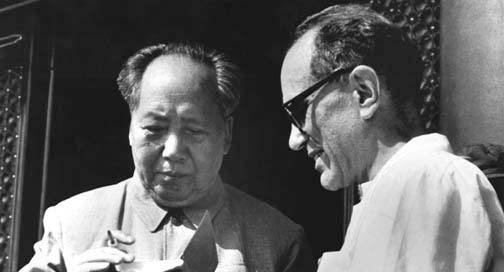



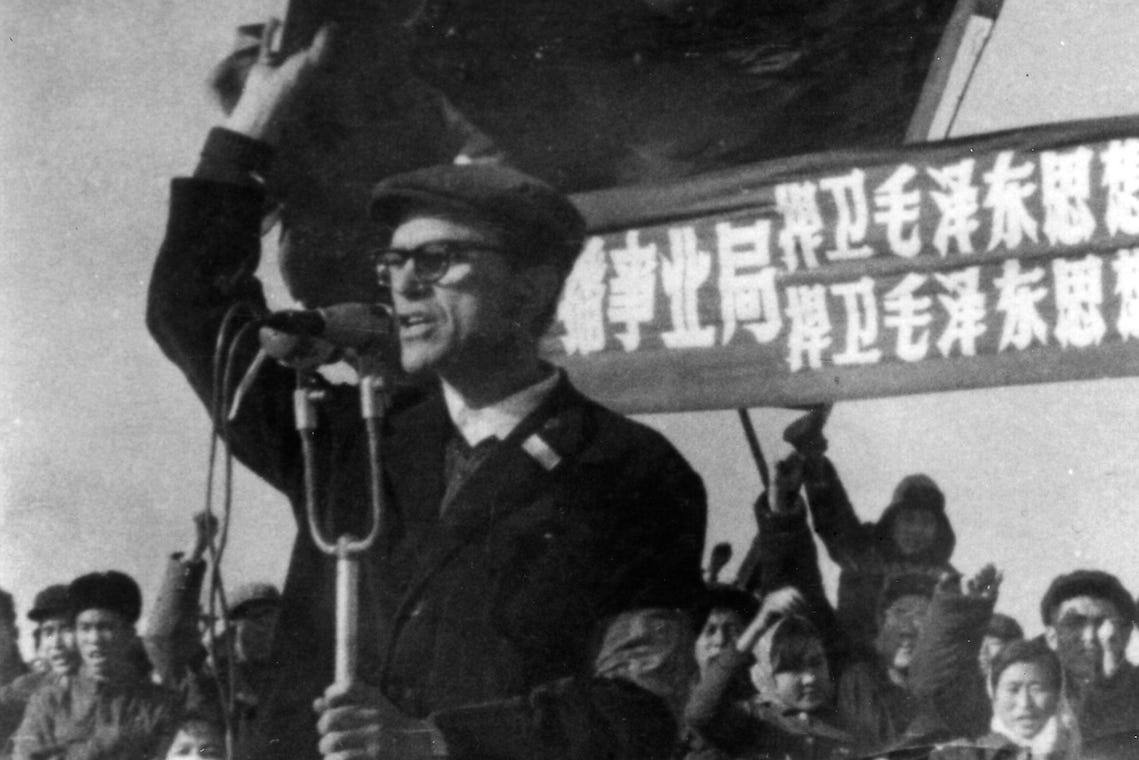
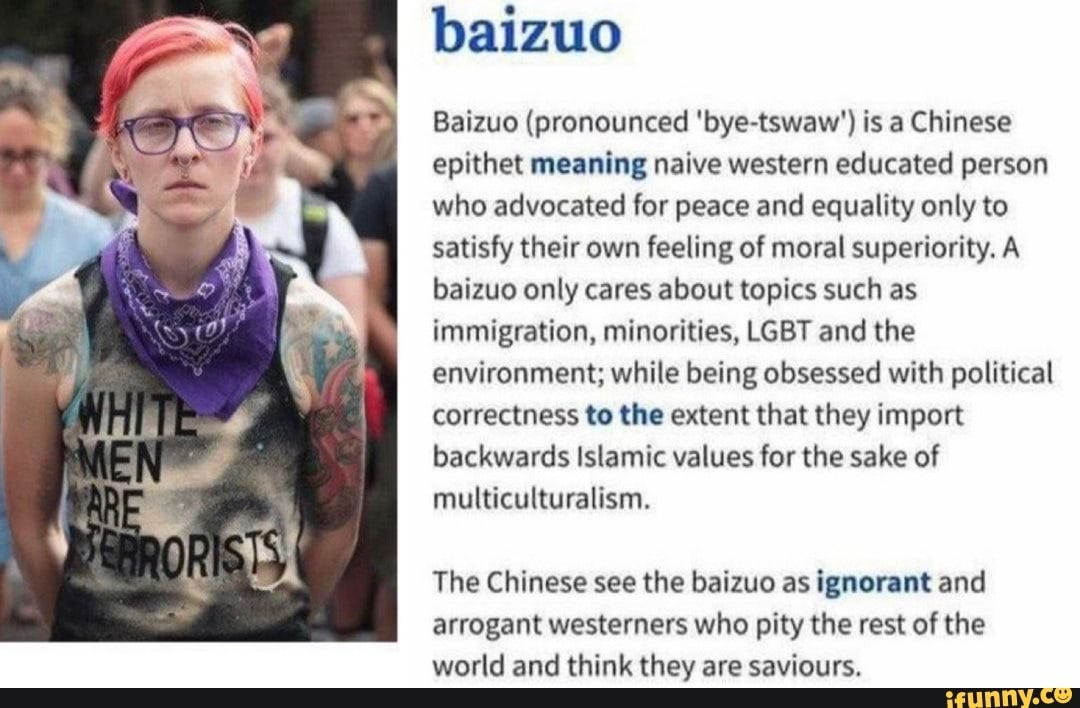
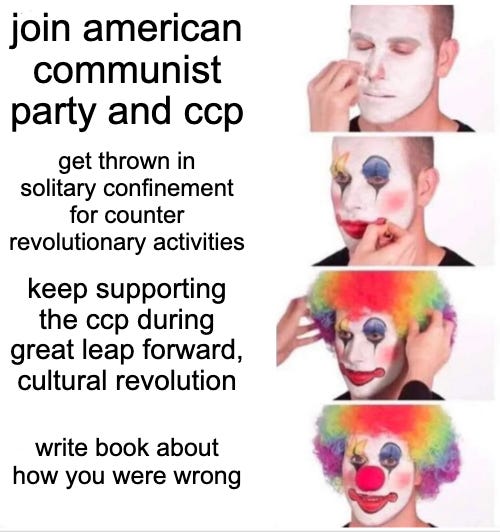

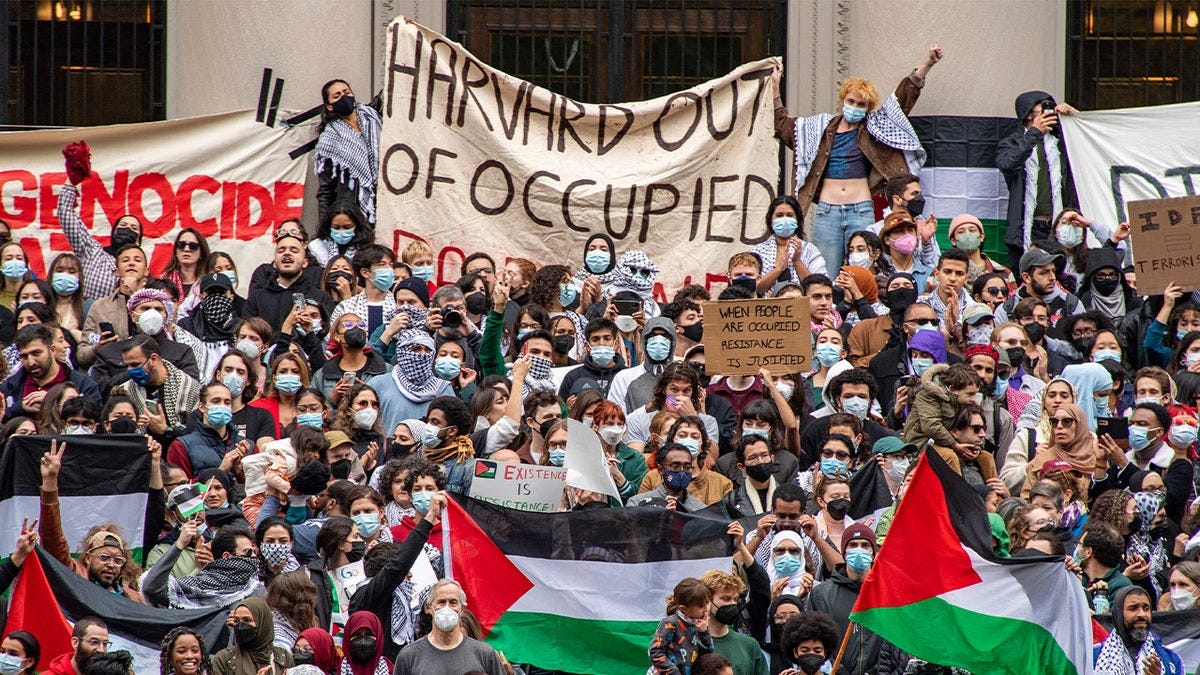
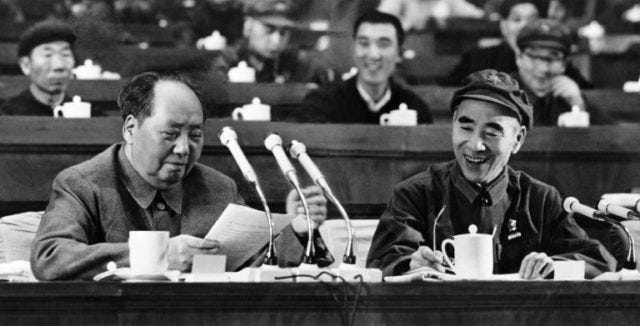
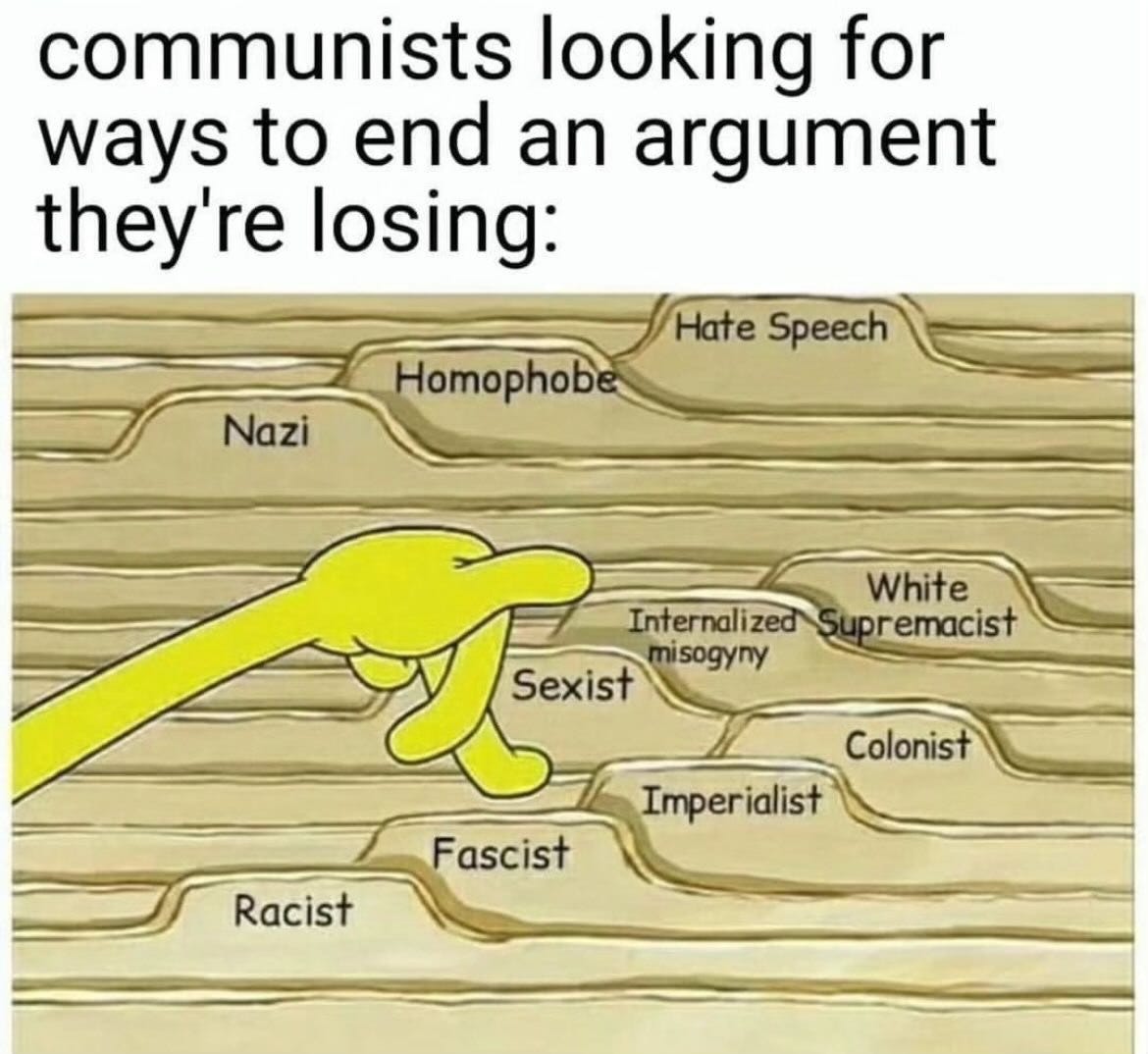
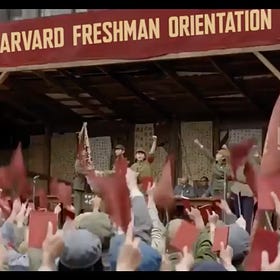
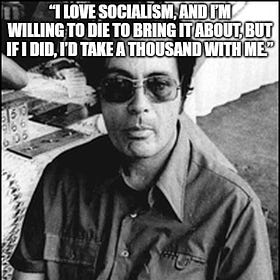
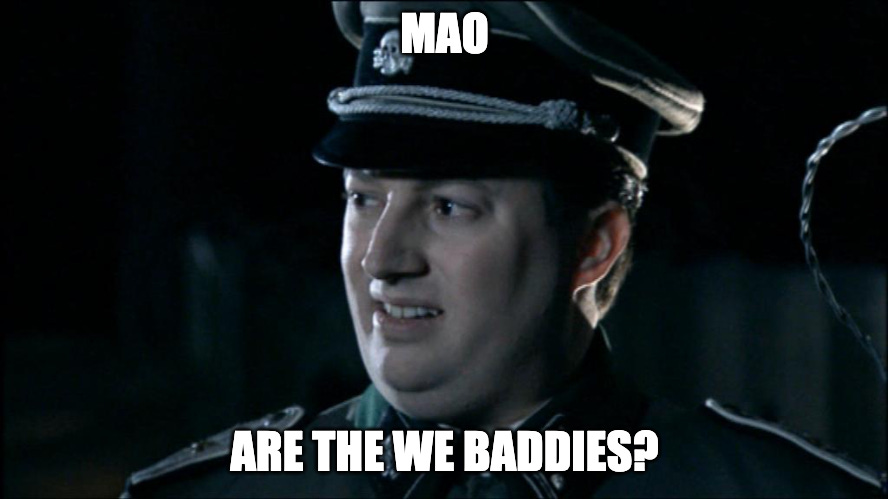

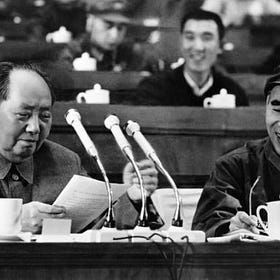
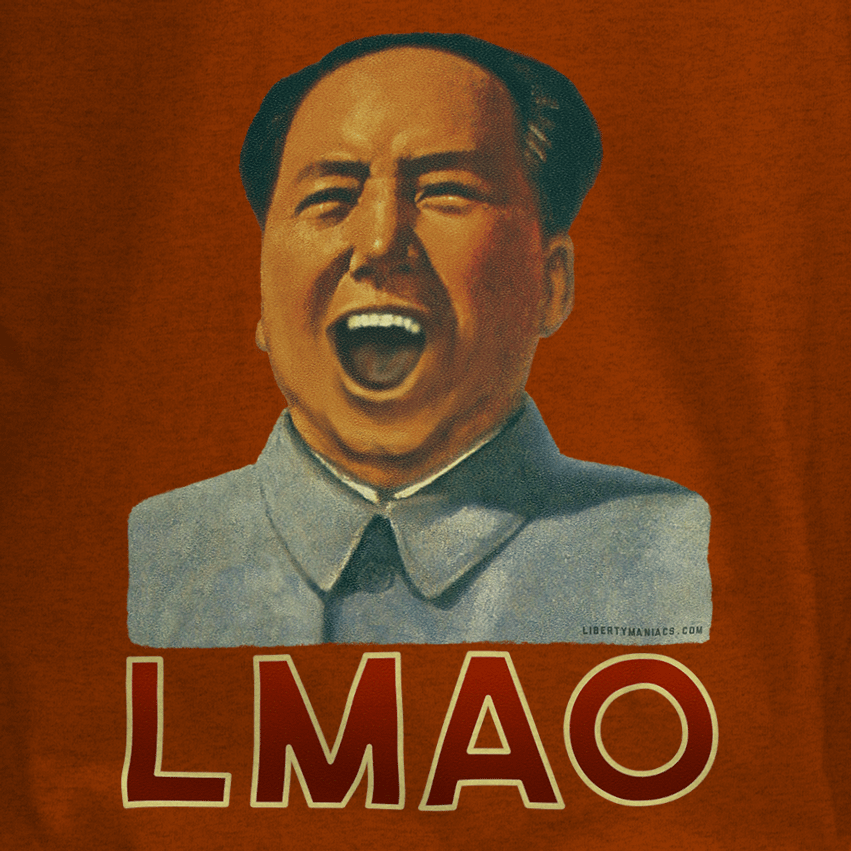
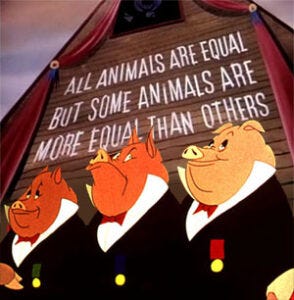
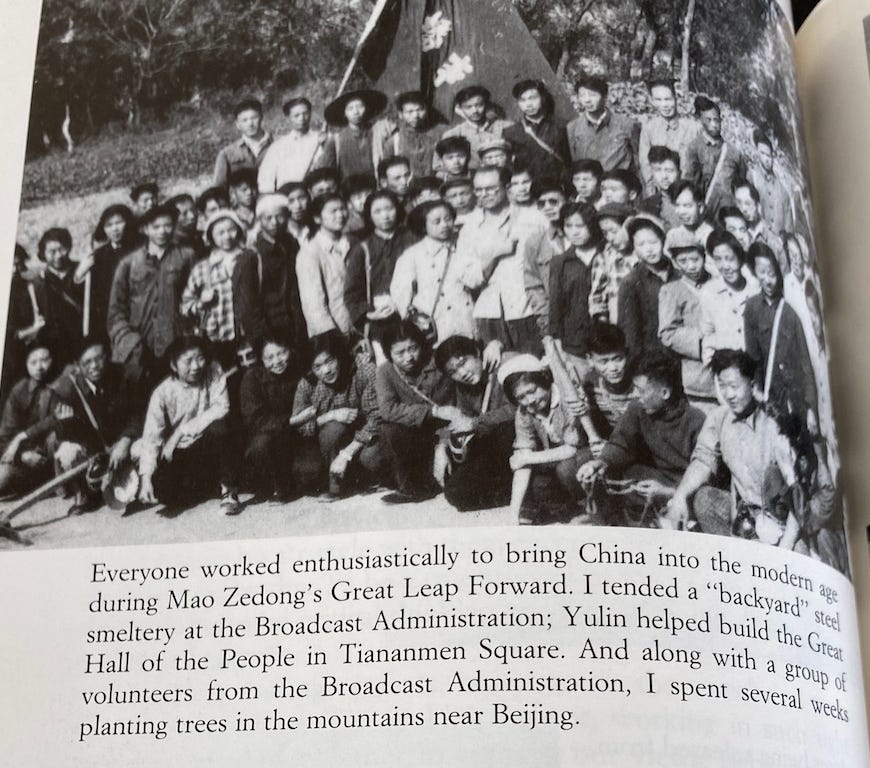
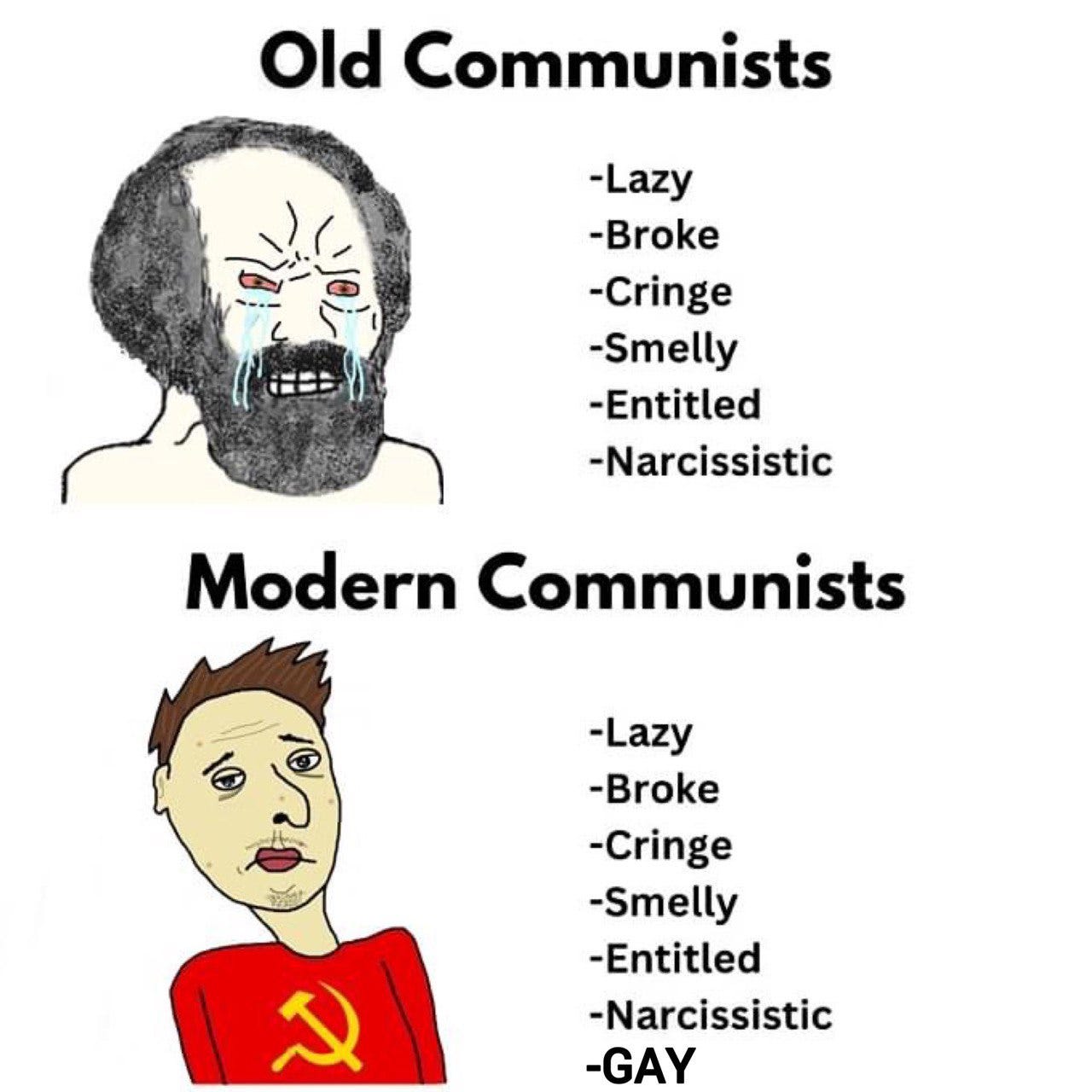
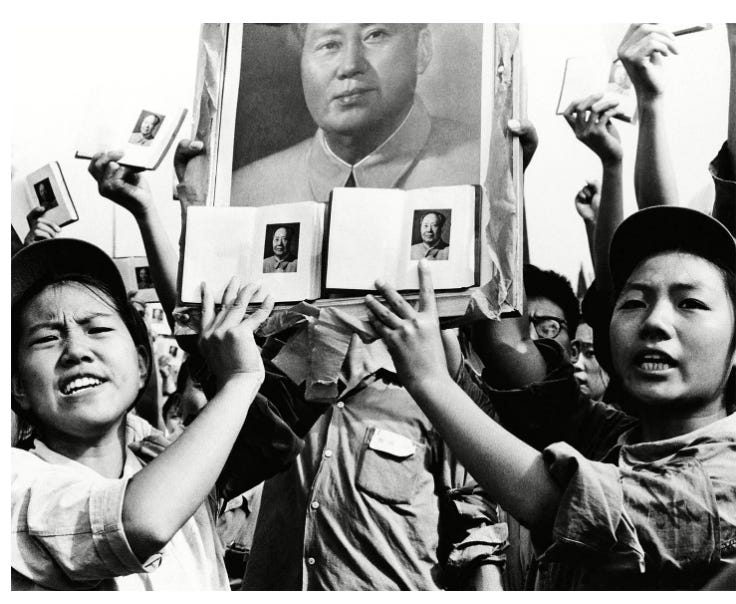
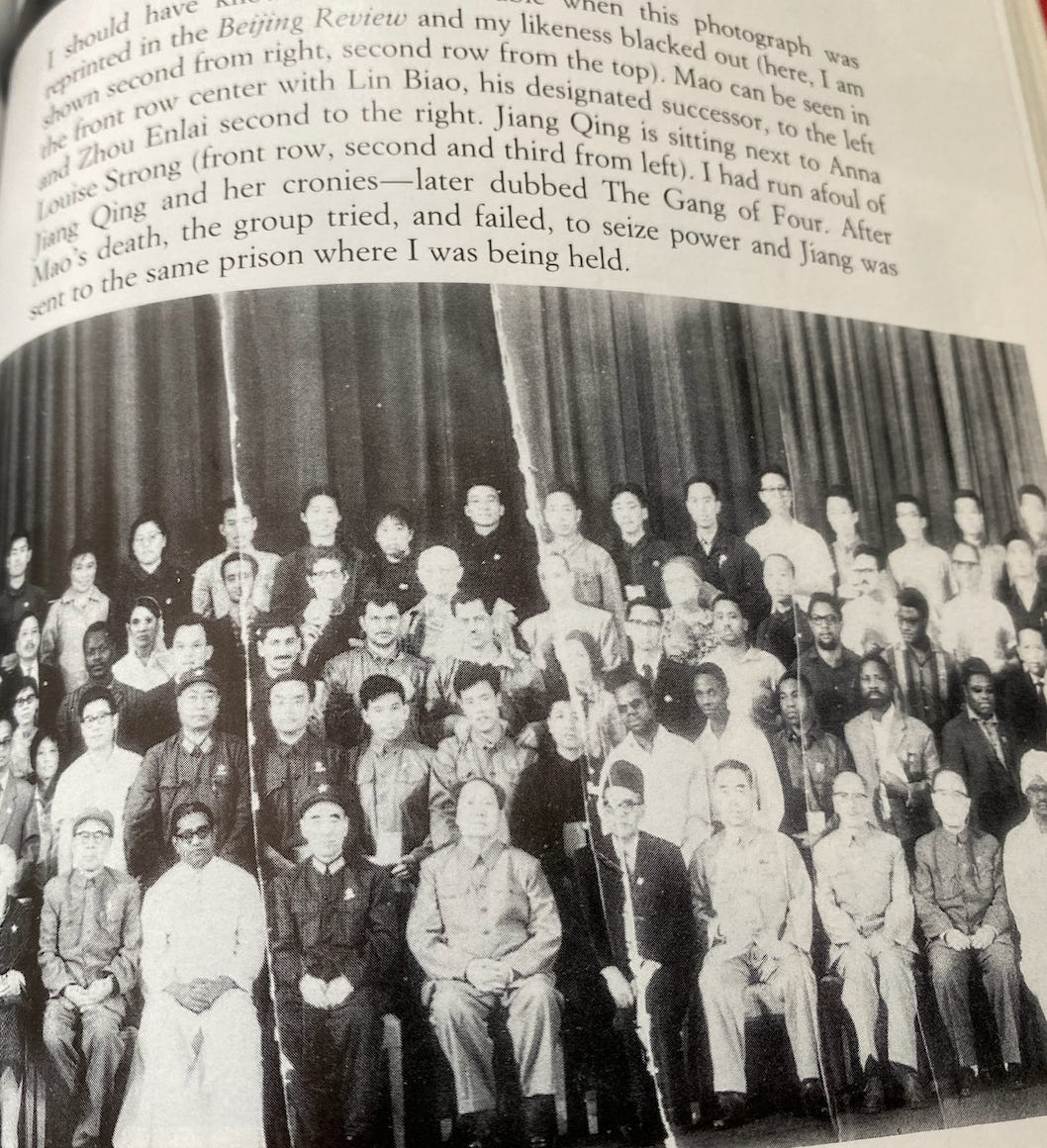
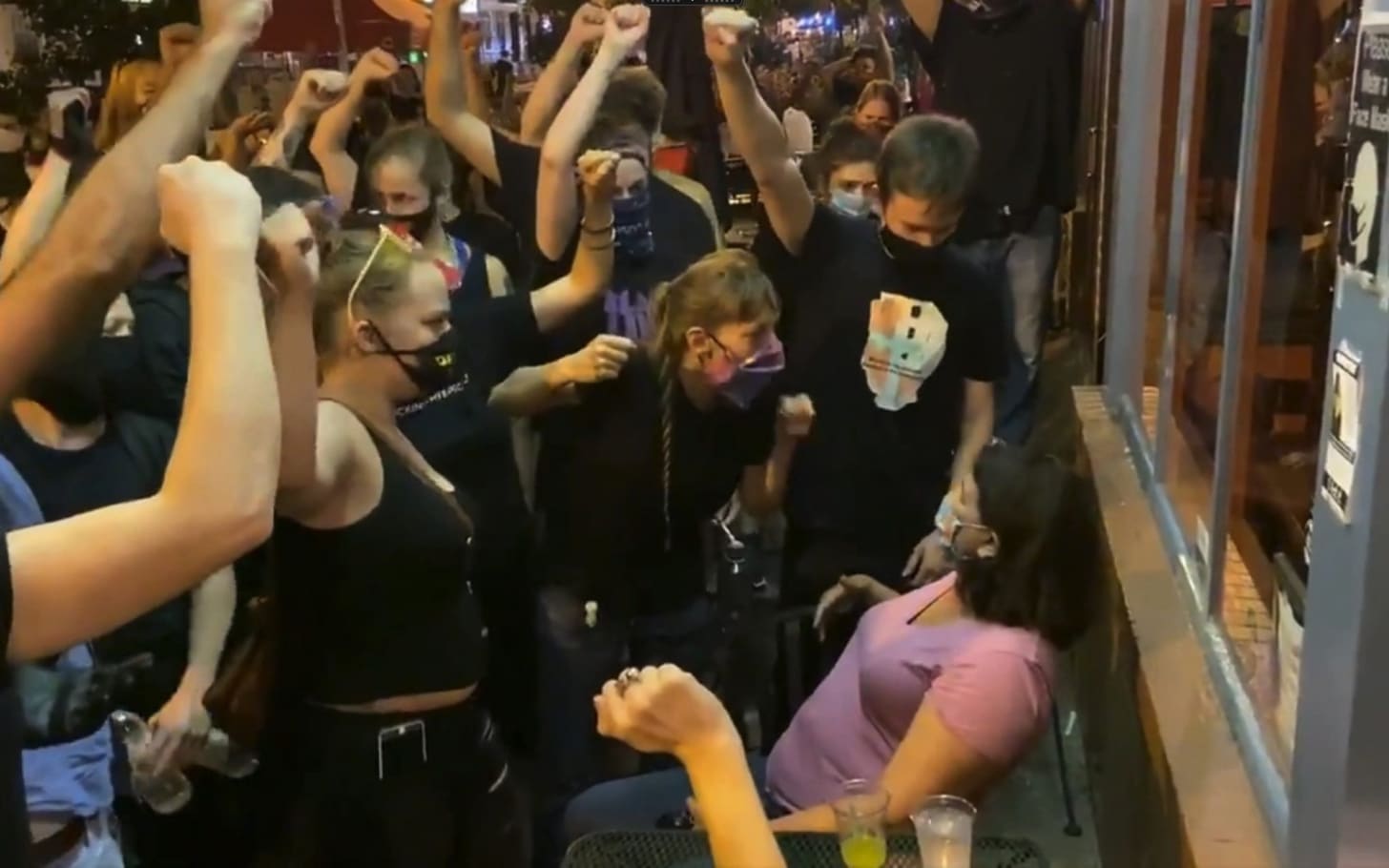
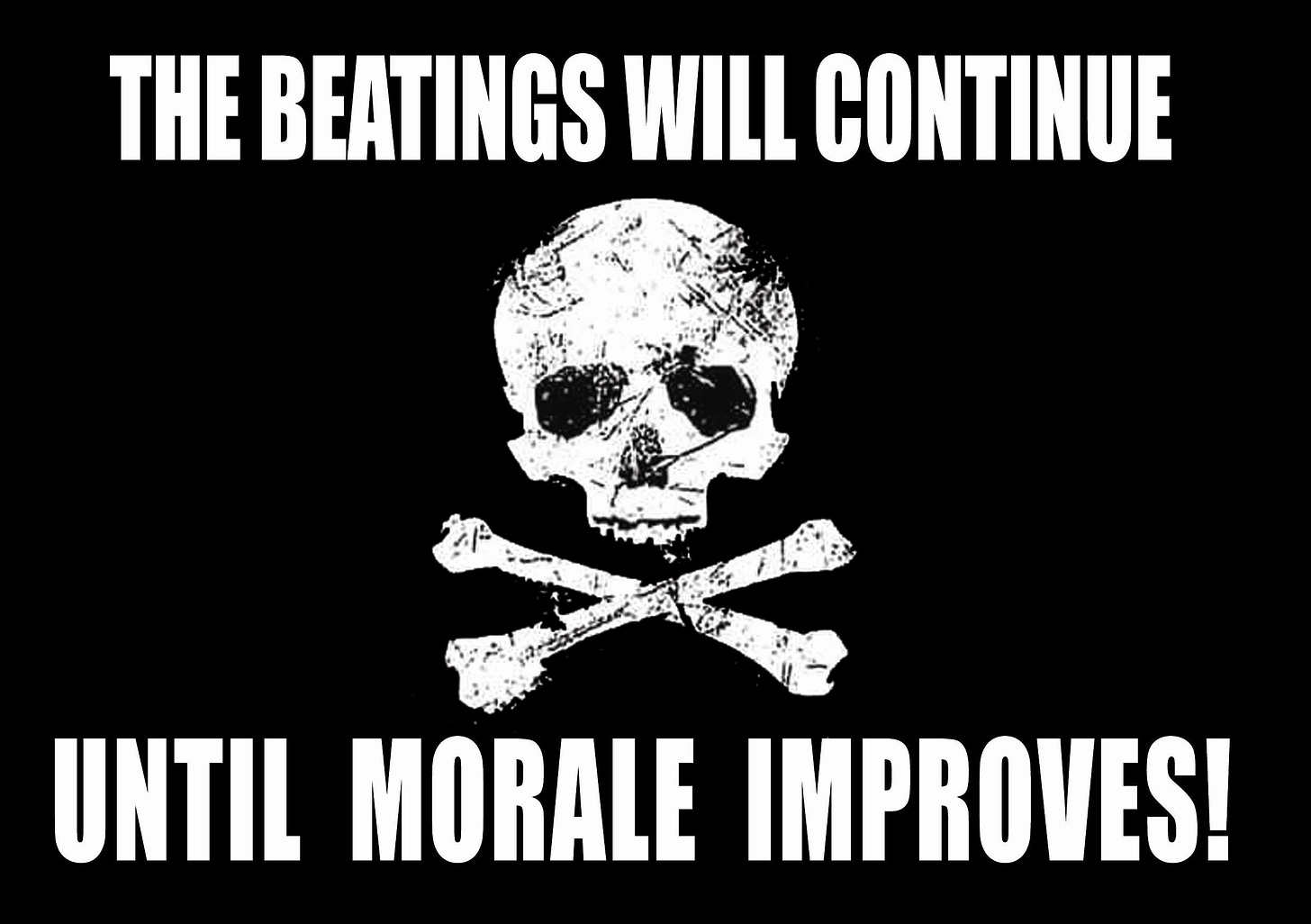
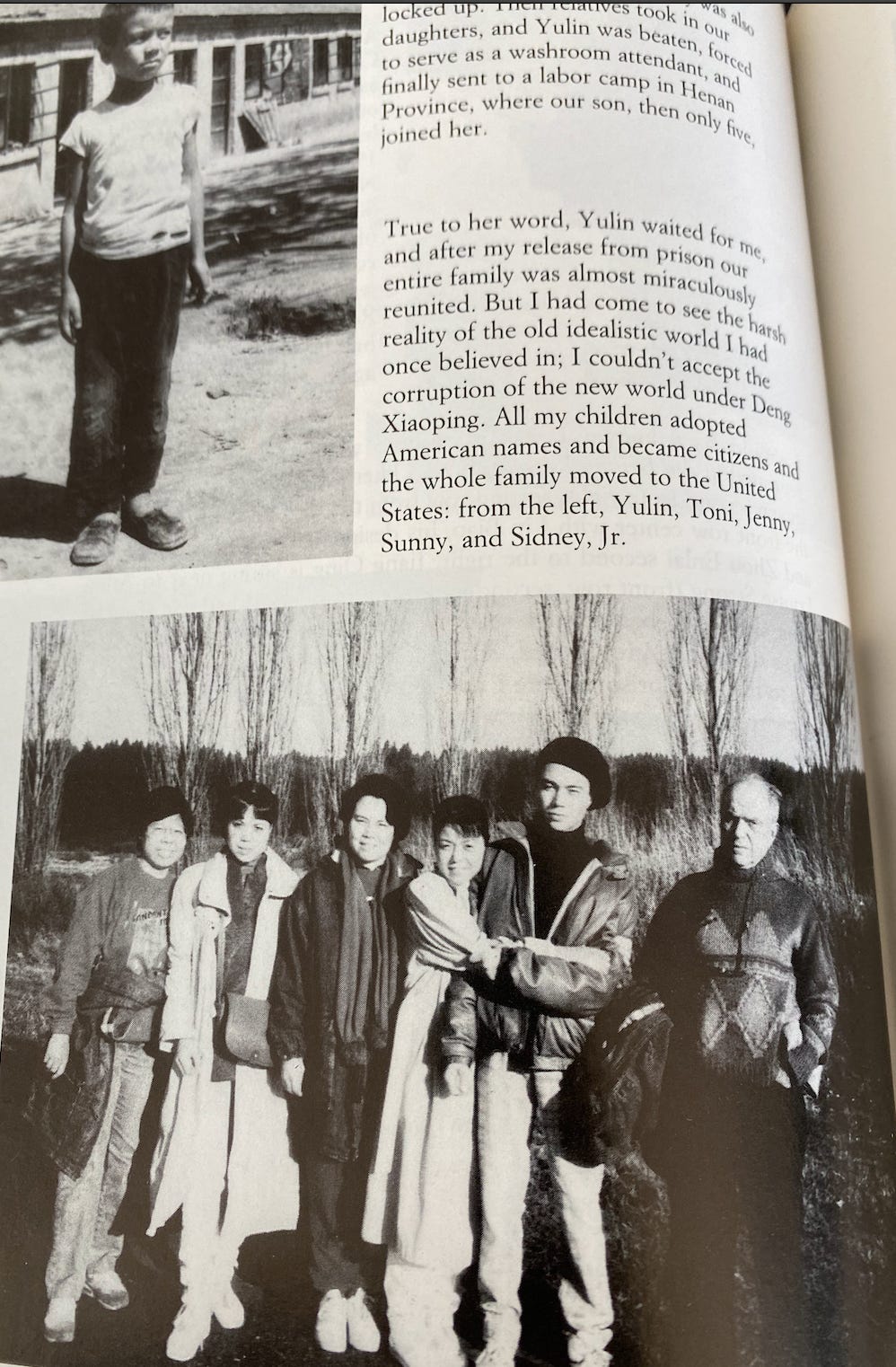
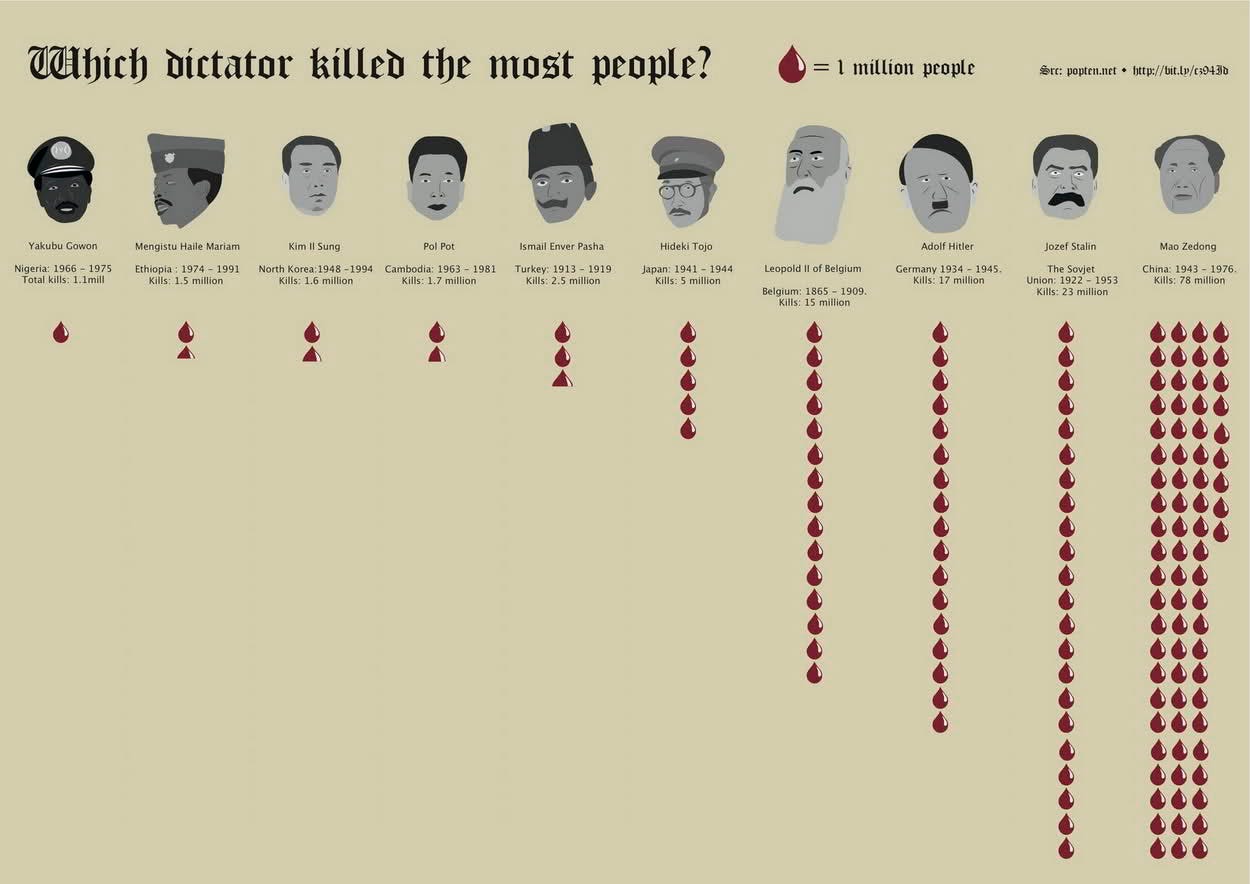
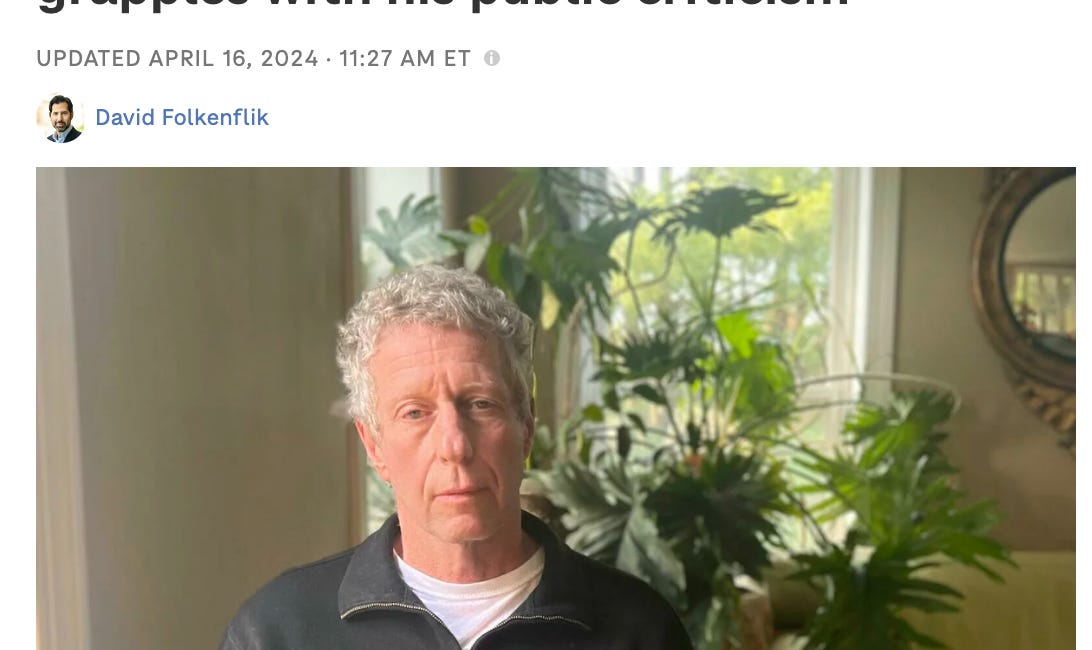
Couldn’t help but notice the phrase “Hope and Change” in your first excerpted paragraph.
I take issue with the “Which Dictator . . ‘ chart, in that it appears to puts all of the blame for the killings on the shoulders of individuals, and ignores the cultures and ideologies that produced these individuals, which were, in turn, a product and reflection, of our common human nature.